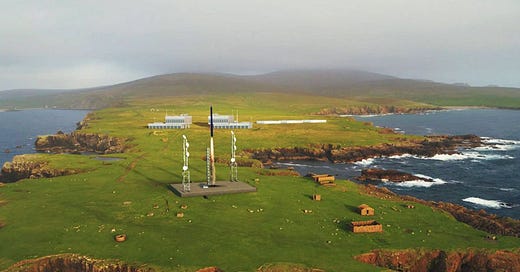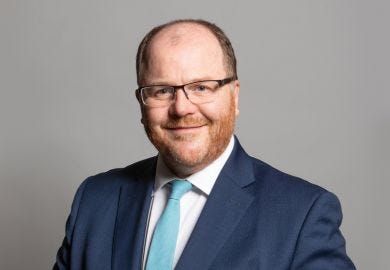Space in Parliament | 19.5.23
Space companies, regulators & the Minister give evidence on space strategy | PwC places UK 2nd for global space investment | MOD funding for space research | +more
Thank you for subscribing to Space in Parliament! I’m trying to grow the readership of this newsletter. If you know anyone who is at all interested in space, aerospace or future technologies, please send them a link to Space in Parliament!
1. SaxaVord CEO to MPs: “We need a Space Czar”
On Wednesday, the Science, Innovation and Technology Committee took evidence from space companies SaxaVord, Orbex and HyImpulse, as well as the Civil Aviation Authoity (CAA — the regulator for space companies) and the Minister, George Freeman.
SaxaVord CEO Frank Strang said it was a “sore point” that his Shetland-based spaceport was the only one in the UK not to receive public sector funding.
Without that funding, they have been more agile, but with it, they could have moved faster and garnered greater respectability.
Strang didn’t go into the details of why SaxaVord had failed to receive public sector funding, but hinted the inside scoop would be shown in a forthcoming Netflix show featuring the company.
Strang and his colleague Dave Ballance praised the work of the CAA as they go through the process of getting their spaceport licence. The licensing got off to a slow start as both sides are learning the ropes of a new process, but they have been reassured by the regulator’s willingness to accept feedback.
He also argued that licences, such as those awarded to the Cornwall spaceport for Virgin Orbit’s failed launch in January, which only allow for two launches a year, would not meet the demands of a commercial strategy.
SaxaVord is negotiating with the CAA for a licence to conduct 30-plus launches a year, and hopes the process will be concluded within 3 months.
Strang said the 2021 National Space Strategy had not been a helpful document — it was not focused enough on the young companies driving growth and change in the industry.
Further, Strang criticised the Government and regulatory landscape for being too fragmented, littered with multiple overlapping organisations.
He called for a “space czar” to lead on centralisation and simplification.
However, Colin Macleod, Head of Space Regulation at the CAA, later told the
Committee that there was no simple solution to regulatory fragmentation, but his team were working closely with partner bodies, to help companies know which other types of licences they would need from the alphabet-soup of agencies.
The CAA has now issued 345 space-related licences and is looking at a further 25 active applications — as it announced on its trip to Scotland this week, where it met with local government and space companies.
The regulator told the Committee it was trying to learn the lessons from the failed Virgin Orbit launch earlier this year. They acknowledged that an event such as that launch consumed the resources of many of their teams beyond the space regulation unit.
However, when the MPs asked the space companies and the CAA whether the regulator was receiving sufficient funds and resources, there was no direct answer.
2. Space companies and regulator to MPs: UK is attractive destination for space companies
In evidence to the same Committee, HyImpulse CEO Mario Kobald explained how Shetland’s geography and SaxaVord’s start-up mentality had attracted his company to placing their tests and launch capacity on the remote island.
Jonas Bjarnø, Chief Technical Officer at Orbex, based in Sutherland, said that his company was attracted to the UK because of the lead taken here on regulation through the 2018 Space Industry Act.
Locating Orbex’s spaceport in Sutherland brought a whole range of socioeconomic advantages to the UK, but without a strong local talent pool to fill the roles, the UK would not get the maximum benefit from those advantages.
He asked the MPs on the Committee to press the Government on training UK specialists in launch systems and propulsion — a point echoed later by the CAA’s Rob Bishton — as well as lowering visa costs for foreign talent.
There was some criticism reported to the CAA from countries which had been affected by the flightpath of Virgin Orbit’s failed launch. But the representatives of the CAA told the Committee that the officials they had spoken with had been happy to work with the UK because they were confident of the regulators long-standing expertise in risk-assessment.
This confidence in the UK echoed comments made earlier by SaxaVord CEO Strang, who pointed to the number of foreign space companies looking to locate their engine tests and launch capacity in the UK.
3. Minister to MPs: big autumn announcement on space sustainability but PNT strategy still in the works
Finally, the Committee heard from George Freeman MP, Minister for Science, Innovation and Technology, and Rebecca Evernden, Director of the Space Directorate within that Department.
Freeman said the Government remains committed to the UK becoming the largest launch pad in Europe.
He said his Department was working on a regulatory review, to look at how to make the licensing process more streamlined, without compromising on safety and the environment.
While it was not clear when that review would be published, he said there would be a big announcement from the Department in September or October on how changes to space regulations can drive a sustainable space environment.
He said the UK had won plaudits at the G7 for the leadership it has shown on sustainability, launch capability and international collaboration. He added that Japanese space agency JAXA had inquired about using UK launch sites for their rockets.
The Committee criticised the Minister for delays to the plan to change the UK regulatory system from unlimited liability to variable liability — a change recommended by the Committee and by Sir Patrick Vallance.
The Minister said this was being actively looked into. There had been a delay so that the industry could have time to respond to the relevant consultation by the UK Space Agency.
The Committee also criticised the Minister for delays to the long-awaited national Position, Navigation and Timing (PNT) strategy. The Minister, again, said work was underway, but there was no clear delivery date.
When pressed on whether the PNT plan would include OneWeb, the Minister said:
“We view our shareholding in OneWeb as a major leaver for our commercial space strategy, and we are in discussion with… the ESA and the EU… We think it is possible for the UK to secure our strategic military and defence PNT requirements with OneWeb as part of a European constellation.”
Tracey Crouch MP pressed the Minister on the Space Council — which was disbanded by Liz Truss and resurrected, albeit in a different form, by Rishi Sunak. She was shocked to hear that the Ministers that would now constitute the Space Council have still not had their first meeting.
The Minister said that important discussions of space were nonetheless happening between Departments and through the National Science and Technology Council. He also cited roundtable discussions with space industry leaders, for example one held last week with the Chancellor at No. 11 Downing St.
Greg Clark MP, the Chairman of the Committee, concluded by asking the Minister when the long-awaited space strategy monitoring and evaluation framework would be published. The Minister said that he had signed off on the document and it would published hopefully before the summer recess.
That document will set out the KPIs against which progress on the National Space Strategy (2021) can be measured and future progress chartered.
While the space companies had told the Committee, essentially, “we want to move fast”, the evidence from the Minister seemed to show that things move a lot slower in his Department.
No wonder Frank Strang doesn’t think the space strategy is a useful document. Two years after publication, the Government still haven’t decided on what terms its delivery will be assessed.
4. Conservative MP Damien Moore asks about commercial space growth
The Conservative MP for Southport tabled a written question on Wednesday to the Secretary of State for Science, Innovation and Technology, asking for figures on the size and growth rate of the commercial space and satellite sector in the UK.
He wanted figures for 2022-23, but the Minister responding, Paul Scully, said that information was not available. However, he was able to provide the following figures for 2018 to 2021:
Those figures reflect the figures published in March in the Size & Health of the UK Space Industry 2022 report.
The Minister reiterated that: “The Department is committed to supporting the growth of the commercial space and satellite sector in the UK.”
5. PwC-UK Space Agency report on private investment in space
“Expanding frontiers: The down to earth guide to investing in space”, produced by consultants PwC with the UK Space Agency, was published on Tuesday and assesses the prospects for the global and UK space industries.
The key findings on the UK space industry include:
2nd leading investment destination of private space capital since 2015 with a 17% share, behind only the US.
£17.5bn domestic revenue accounting for a ~5% share of the global space sector.
18% UK GDP underpinned by space, driven by space-derived data, applications and services.
1 global producer of top-cited space research, with over 50 UK universities having active space science functions.
1,590 UK space companies operating in the UK space sector across the end-to-end value chain.
Matt Alabaster, Partner at PwC Strategy&, said:
“there are opportunities for investors of all stripes… asset-light and technology-driven businesses, as well as infrastructure assets and supporting services businesses, all… stand to benefit from the significant growth of the global space industry”.
Taking into account government, non-commercial (universities and research institutes) and commercial organisations, the report describes the UK space sector as a “hidden utility” that underpins our daily lives and supports an estimated £370 billion of the country’s economy, mostly through satellite-based services.
The executive summary also noted:
“The UK Government recognises both the economic potential of the space sector and its strategic importance to society, and as such is investing in key space technologies and applications to reduce technical and business risk.”
6. Ministry of Defence research funding for future space technologies
The Defence and Security Accelerator (DASA) has launched Space to Innovate – Charlie Drop, a competition funded by MOD Chief Scientific Adviser.
Up to £1.5 million in funding is available for “innovative technologies that can aid UK defence and security to develop future space science and technologies”.
DASA is looking for entries in three areas:
novel ways to achieve fine resolution collection for intelligence, surveillance & reconnaissance (ISR)
technologies and techniques to alert, protect and defend satellites
satellite and ground segment technologies for future Defence operations.
The Space to Innovate Campaign was set up in 2019 to aid UK Defence and Security to develop future space science and technologies. As the third drop in the Space to Innovate Campaign, Charlie Drop follows on from Alpha Drop and Bravo Drops.
Tony Forsythe, Head of Space technology at the UK Space Agency, said: “We rely on similar underpinning technologies for civil and defence uses of space and, by working together with our partners at Dstl and DASA, we can tackle shared challenges and seize significant new opportunities.”
7. Ordnance Survey to see sewage spill from space
Ordnance Survey has partnered with consulting firm CGI on an initiative designed to remotely detect sewage overspill events from space.
The project, based in the North Devon UNESCO Biosphere reserve, will utilise a newly created artificial intelligence (AI) model that can predict with high levels of accuracy the conditions most often associated with pollution events.
It is part of CGI’s Sustainability Exploration Environmental Data Science (SEEDS) programme, which launched at the United Nations last year.
Using available data from the UK Environment Agency combined with data from CGI, Ordnance Survey, North Devon Biosphere and OpenSource satellite data, the project will use AI to map out where incidents of pollution have taken place over a time period using CGI’s GeoData360 platform.
Objects in outer orbit: Inmarsat, Space debris, UEFA, Japan, Space Force, Space food and Lesabendio’s advice
Last week, I reported on the Viasat’s takeover of UK satellite company Inmarsat, which was approved by the Competition and Markets Authority. This week, The Times reported that Inmarsat enjoyed the strongest quarterly results in its 44-year history, in its last quarter before the takeover, which is still awaiting EU and US approval. The deal is part of “a flurry of consolidation in the industry,” including OneWeb, backed by the UK government, and France’s Eutelsat.
Meanwhile, Raveej Suri, Inmarsat’s Chief Executive Officer, gave a stark warning about space debris in a recent speech at the 6th New Space Atlantic Summit, organised by the Portugal Space Agency in Lisbon. Suri said: “So far we have been lucky that we haven’t seen any major collisions in space, but we would be foolish to rely on luck alone.”
Prof Hugh Lewis at the University of Southampton has recently published data that showed in March alone SpaceX Starlink satellites performed more collision avoidance manoeuvres in a single month than in the entire first 2.5 years of Starlink deployment.
UEFA, the football governing body, has signed an agreement with the European Space Agency to use satellite imagery in three areas: pitch mapping, crowd management and sustainability. Now if you try to jump the turnstiles, you’ll be caught from space!
On Monday, the UK and Japan signed a renewed science and technology deal, following initial joint UK-Japan projects announced as part of International Science Partnerships Fund in December. Quantum, life sciences and semiconductors all got special treatment, but no mention of space. However, as I reported above, Minister George Freeman (fresh from his trip to Tokyo) told a Select Committee that the Japanese space agency was keen to work with UK spaceports.
“We just finished defending our budget on the Hill and it’s been well received” — so US Space Force Gen. David Thompson told industry leaders at the Space Force Association this week. It seems the debt ceiling crisis does not extend to space (at least, for military use).
NASA will announce today which teams have progressed to the final of the Deep Space Food Challenge, as the push for innovative solutions to long-term human missions to the moon and Mars continue. MIT Technology Review has a fascinating story on the menu options, including one system “that could use the carbon dioxide expelled by astronauts in space to produce alcohol, which could then be used to grow edible food.”
If you haven’t read Paul Scheerbart’s trippy “asteroid novel” Lesabendio, first published in 1913, check it out. The protagonist, a strange creature living on a star formation, hatches an elaborate and mysterious plan of engineering and self-discovery. When Lesabendio’s friends reject his scheme, he tells them:
“You are all so tired—but it’s only because you don’t concentrate your thoughts on a simple but ambitious plan. Concentration of that sort is refreshing on its own, even when the plan’s fulfilment is still far off. You let yourselves get bogged down.”









